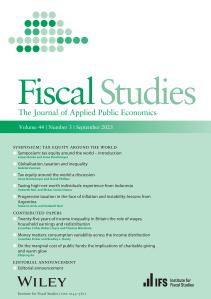In his budget speech Jeremy Hunt made the following statement. “The average earner in the UK now has the lowest effective personal tax rate since 1975 — and one that is lower than in America, France, Germany or any G7 country.”
Given that the overall tax burden — the tax take as a fraction of national income — is reaching record levels, it is a remarkable claim. I have neither heard nor seen much commentary on it. Paradoxically that might well be because it is demonstrably true. Average earners really are facing lower levels of direct taxation than they have in 50 years. And it is from average earners that higher-tax countries in western Europe get much of their extra revenue.
To see the truth of the historical claim, just look at how things have changed. The basic rate of income tax has come down from 35 per cent to 20 per cent over the past 50 years. The tax-free allowance is being squeezed, but it is still at historically high levels following big increases during the 2010s. And while, at 8 per cent, the main employee element of national insurance is higher than it was in the 1970s, it is lower than at any time since 1982.
Someone on £35,000 today — about the average for those working full-time — faces an income tax and national insurance bill getting on for £2,000 lower than would someone on the same real earnings back in 2010. Just looking at changes enacted over this parliament, the national insurance cuts more than outweigh the income tax increases for middle earners, with gains peaking at around a handy £1,000 a year for anyone earning about £50,000. That is not a tax cut to be sniffed at.
And yet, as I have written here before, the overall tax burden really is heading to record levels. It was stable at about a third of national income from 2010 to 2019. It has risen by a hefty 3 per cent of GDP, about £75 billion, since then — a record increase over a single parliament. It is higher this year than at any time since 1950. That is quite a trick to pull. The overall tax burden close to an all-time high. The direct tax take from an average earner at its lowest in half a century. How can that be?
Over the short run a large part of the answer is that the chancellor has got lucky. Lots of inflation has been good for VAT revenues. Corporation tax revenue has increased by more than can be explained simply by the increase in the tax rate. A combination of income growth and freezing of thresholds has been good for the income tax we bring in from higher earners.
While average earners have seen their tax bills fall, the reverse is true of high earners. Someone just about in the top 1 per cent of income tax payers, on £200,000, say, will be paying a good £10,000 a year more than in 2009. Our reliance on top earners has continued to grow. That top 1 per cent pay 29 per cent of all income tax now, up from 25 per cent in 2010 and 21 per cent at the turn of the century. Whisper it quietly, but this Tory government has taken a serious chunk out of the incomes of the 1 per cent.
The tax share from that top 1 per cent has risen not for the same reasons it did in the previous 30 years. It rose dramatically between 1979 and 2008 despite the tax system becoming much more favourable to the rich. It rose because the rich got so much richer: there was a lot more income to tax. That has not been the case over the past 15 years. The tax take from the rich has risen because of policy change. Until 2010 the top tax rate was 40 per cent. There is now an income tax rate of 60 per cent on incomes between £100,000 and £125,140 and 45 per cent on income above that. This government has additionally severely limited how much higher earners can put into a pension free of tax each year.
It is not only high earners who have been squeezed. Pensioners have too, at least through the tax system. The narrative is very much of a coddled older population enjoying a triple-locked state pension and sitting on piles of housing wealth. They have indeed benefited from generous indexation of their state pension, and were the big winners in the housing market lottery.
But they have also seen growing tax bills. While average earners have benefited from tax cuts since 2010, pensioners have not. They don’t pay national insurance contributions so don’t benefit from the national insurance cuts. And while the tax-free allowance for those of working age remains higher than it was in 2010, that is not true for pensioners. They used to benefit from a more generous tax-free allowance than the rest of us. They no longer do. No need to weep, perhaps. Their incomes are still taxed more lightly than are the earnings of those of us who still toil for a living.
One question we should ask ourselves though is how long can this last? As we settle into a higher-tax economy, can average earners continue to be protected? If we were to implement the tax system of a typical high-tax European Union country it is middle earners who would be hit hardest. Further planned freezes to income tax allowances and thresholds will indeed take more from them. We will reach a limit in terms of what we can squeeze from companies and high earners. At that point the political and economic imperatives will start clashing much more clearly than they have up to now.
This article was first published in The Times, and is reproduced here with kind permission.










